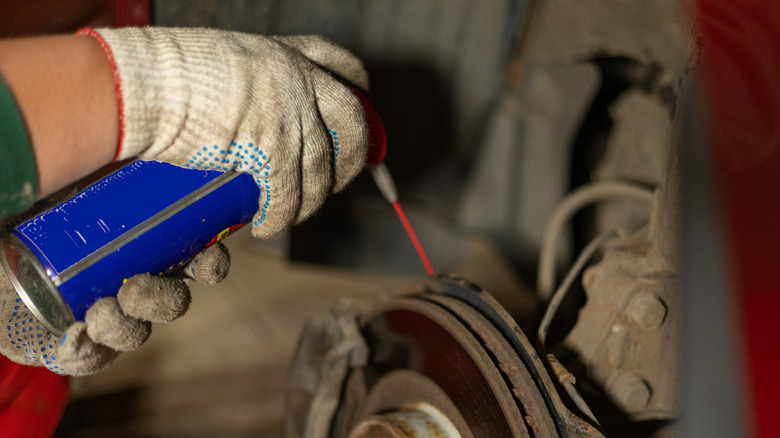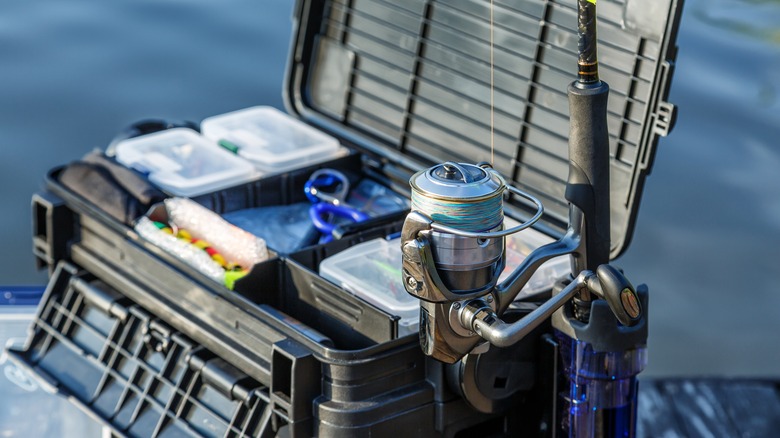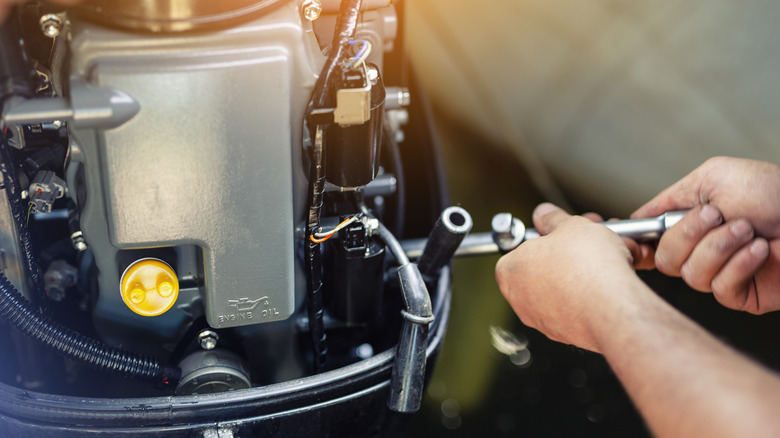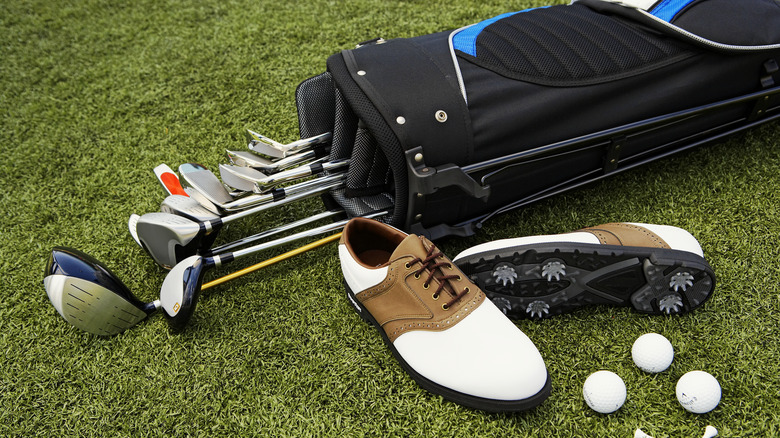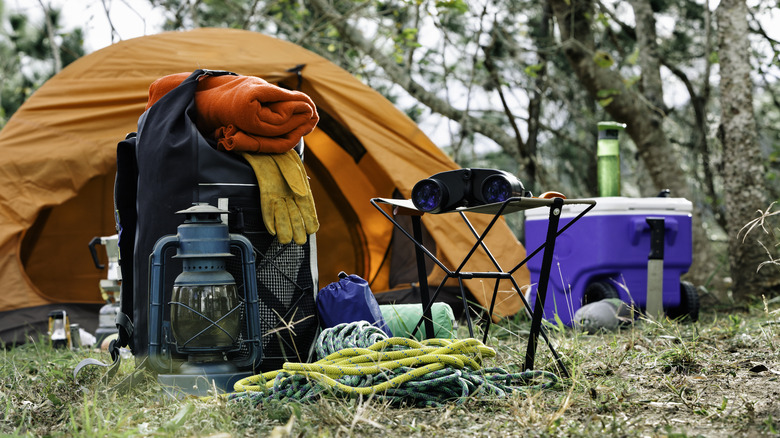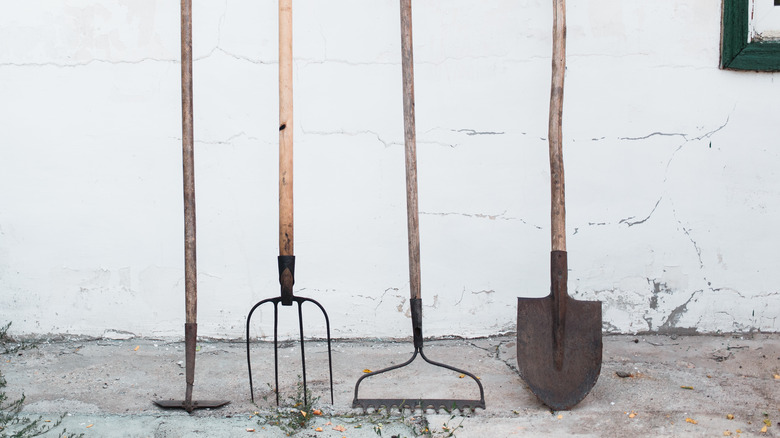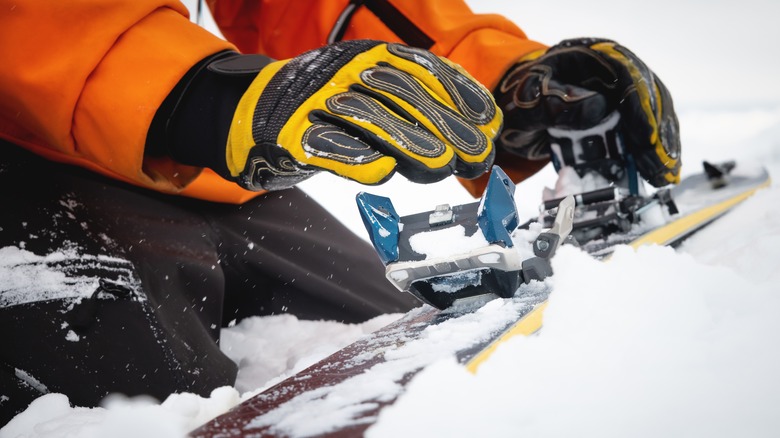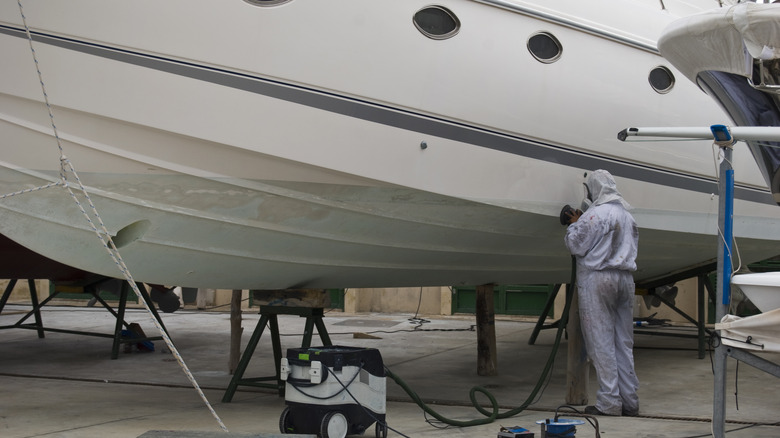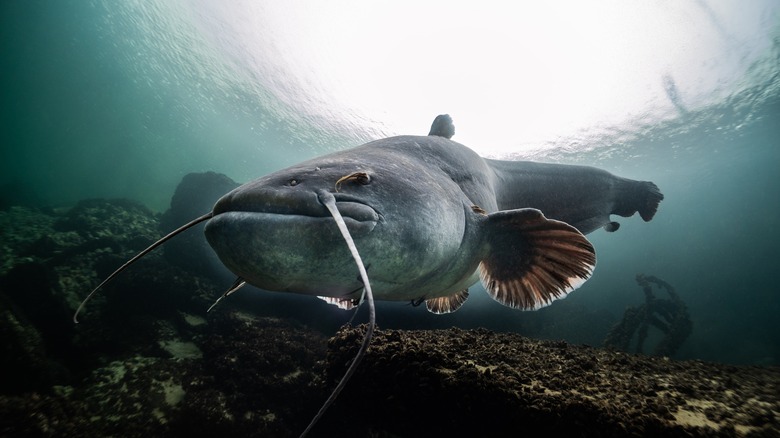10 Fantastic Uses For WD-40 On Your Outdoor Sports Gear & Equipment
WD-40 is something you will find in almost every garage. You've likely heard your dad, grandpa, or mechanic espouse its many uses. Got a squeaky door? WD-40. Got a rusty spark plug? WD-40. Got a sticky snow shovel? WD-40. You get the idea. We're being verbose, of course, but when have you been presented with a home or mechanical project where WD-40 hasn't come in handy? Seriously, the stuff can do so much, especially when it comes to maintaining your outdoor equipment and sports gear.
We should probably take a minute to explain what WD-40 actually is. According to the manufacturer, the "WD" in WD-40 stands for water displacement. That's its primary purpose: to displace moisture by using a secret recipe of lubricants and anti-corrosion solvents, per WD-40. The result is an all-new solvent that can do a whole heck of a lot more than just prevent water penetration.
As you'll see in this upcoming list, WD-40 can be used for a whole bunch of different things on a whole bunch of different equipment. Whether it's maintaining your fishing gear, keeping your bike chains from rusting, lubricating your skis, or cleaning the bottom of your boat, if there is an outdoor problem, WD-40 can fix it.
Maintaining fishing gear
Though a lot of anglers take pride in the fact that their fishing equipment is well-used, a certain amount of maintenance is required in order for that equipment to stand the test of time. A lot depends on the type of fishing outfit you have. Whether you're into fly fishing or spin fishing, you need to come up with a cleaning regimen for your gear, preferably one that includes WD-40.
WD-40 is great for use on a spinning outfit. Fly fishing reels benefit from some cleaning, but the bearings system inside the actual reel is far less complicated than a spin rod. With these, the weight of the lure and the mechanics of the reel are what help cast and haul in fish. Therefore, you're going to need to make sure that the interior is well-lubricated and cleaned before the start of each season and every so often during the season.
Inside the fishing reel is what's known as the spool, around which the fishing line is spun. After you've cleaned the spool, spray the inner bearings with WD-40. Not only will this lubricate the bearings, but it will wick away moisture, therefore keeping them from getting clogged and rusty. You can also spray WD-40 on your reel housing and elsewhere along the rod to keep things moving and free of rust.
Keep bike chains dry
Depending on how often you ride your bike, it is going to see its fair share of weather. Other than the sun, rain is probably the most common type of weather your bike is going to see. We can't think of too many people who will go cycling during a blizzard. Can you? What we're saying is this: whether you're pedaling through a rainstorm or just splashing through a large puddle, your bike's chain is going to get wet. And if you don't want it to corrode, you need to be using WD-40 on it.
The bike chain drives the machine forward by connecting the rear gears to the main crankset. The tension created between the two through the act of pedaling is what moves the bicycle. So, if your chain is rusting because you haven't taken the time to clean it in a while, WD-40 is going to be your friend.
Thanks to the fact that it literally displaces water, a healthy application of WD-40 to your bike chains will help keep them dry, rust-free, and clear of any sediment. The very last thing that you want before or on a big ride is a chain that's an inch away from snapping due to rust. Keep in mind, though, that WD-40 is primarily a de-greaser and water deterrent. It is not considered a proper lubricant for bike chains.
Lubricate and protect boat motors
If you've spent any amount of time out in a motorboat, you will know that things get pretty wet. There is absolutely no chance of you staying 100% dry. Therefore, you dress as such, wearing moisture-wicking fabrics and probably a bathing suit underneath. So, if you're that prepared to get wet when you're out on your boat, why haven't you bothered to protect your motor in the same way?
Whether you have an outboard or an inboard, the driving force of your boat spends practically its entire career sitting in the water. Whether it's saltwater, freshwater, or the torrential rain of a passing hurricane, your motor can go through a lot. And you simply cannot be reliant on gravity to remove excess moisture from the engine.
Though boat motors are built with a degree of water protection, they are not totally impregnable. You are going to need to make sure that you're doing your part to protect the important elements of the engine, such as the spark plugs and other metal components, all of which can corrode when exposed to too much water. WD-40 can clean the interior of the engine, as well as provide some much-needed water displacement to the spark plugs, which need to stay dry in order for combustion to happen. The application of WD-40 can also help in the event of a flooded engine. Simply spray the solvent inside the terminal before replacing the spark plug.
Prevent golf club corrosion
If you've made the investment into a nice set of golf clubs, you're going to want to make sure that nothing bad happens to them. Though a head cover certainly helps in this regard, it cannot do everything. Yes, the head of the club needs to be protected, but don't neglect the other components of the instrument as well. That would be like owning a trumpet and only focusing on keeping the bell polished. Therefore, you can't go wrong with a good application of WD-40.
Your clubs are going to be exposed to dirt, grass, sand, and water during a typical game of golf. So, more than just giving your clubs a good wipe down before you put them away, take some WD-40 to them to really seal the protection deal. This is really only advised with irons and wedges, as they are the ones made completely from metal. Using WD-40 on wooden drivers is not recommended.
As we've already seen, WD-40 prevents corrosion from occurring by displacing moisture away from metal surfaces. The same is true with golf clubs. The coating provided by the WD-40 will continue to help displace water even after it has been applied. Plus, the lubricants in WD-40 will also help give your golf clubs a nice polish. You can even give the leather handles a rub down to soften, protect, and exfoliate the leather.
Protect camping gear
Of all the items on this list, except perhaps boats and fishing gear, your camping equipment is going to get exposed to the most elements. Depending on when and where you go camping, rain, snow, sleet, mud, dirt, and dust are just the name of the game when it comes to enjoying some time in the great outdoors. Sediment can get in everywhere. As a result, your camping gear will take its fair share of abuse. Over time, this abuse will affect how the gear performs. Luckily, this is where WD-40 can help.
It can keep the zipper of your tent and sleeping bag from going rusty. It can keep mildew and mold from growing inside of your cooler. You can use it to make your camp cooking gear shiny and rust-free. It can keep corrosion from taking place on the surfaces of your camp stove. It can lubricate tent poles. The point is that you need to have some WD-40 with you when you go camping.
The stuff works by preventing the types of issues that occur when too much moisture is present in a place. So, instead of just having WD-40 save you out in the wild, you need to be using it when you store your gear during the off-season. You'll need to air things out before your first trip, but it'll be worth it.
Maintain garden tools
All the tools in your shed, power or otherwise, need to be maintained on them to make sure that they can run for as long as possible. You don't want to end up with a rusty chainsaw, corroded lawn mower blades, rusted garden rakes, and pitchforks. This is why WD-40 should be a fixture in every garden shed.
You can use WD-40 to clean the metal components of your gardening tools. This includes saw blades, shovels, rakes, axes, and the like. The solvent will help wick moisture away from the metal, polish it, and keep corrosion from occurring. Clean the tools after every use and it will extend their life indefinitely. WD-40 comes in very handy with lawnmowers, tractors, and snowblowers.
As these have engines of their own, the WD-40 can be used to protect their spark plugs, the same as you would with the boat motor. However, where the stuff really excels is in the lubrication and protection of the blades. The blades on tractors, lawnmowers, and snow blowers are what cut the grass and send the snow flying. You don't want these to get rusty. Otherwise, you're going to be replacing them much sooner than you'd like. Apply a good layering of WD-40 to them whenever you clean or sharpen them. It's only going to help extend their life and keep money in your pocket.
Lubricate and protect ice skates, skis, and snowboards
Seeing as all of these are in constant contact with moisture, whether it's the powder of the slopes or the ice of a skating rink, skis, snowboards, and ice skates need to be constantly lubricated in order to keep working to their fullest. Ice skates, in particular, are in need of WD-40's assistance as a method of preventing rust.
Rust is the enemy of ice skates. Rusty skates that are not consistently sharpened actually pose something of a danger to the skater. They will get caught and snag on any inconsistencies on the surface of the rink. Properly lubricated and sharpened skates, on the other hand, will glide over ice like a dream. You can have a pro shop sharpen the skates, but you're going to need to apply the WD-40 yourself, either before or after skating.
WD-40 can help keep your skis and snowboard lubricated as well. However, it's the bindings that are going to need the most application. Wax is the preferred method of maintaining the blades of the board and skis. But the bindings, which are the metal components that attach the boots to the skis or board, need to be lubricated to ensure that they don't get stuck or corrode.
Clean the bottom of your boat
Though the running joke is that your wacky uncle's moonshine could clean the underside of a boat, you needn't go to such drastic measures. A few cans of WD-40 should help you get the job done. Since its original purpose was to remove grease and grime and prevent rust by displacing water, WD-40 can make for an amazing solvent that will make scraping the bottom of your boat all the easier.
WD-40 can protect your boat whether it's only been in the water for a day or whether you're getting it ready for winter storage. If you've got a metal paddle boat, such as a canoe or rowboat, spray some of the solvent on the hull every time it comes out of the water. It'll keep it clean and corrosion-free. The same is true for a boat that's been sitting in the water for a long time and has a buildup of algae and barnacles.
Allow the WD-40 to soak into the underside of the boat for a while before taking a putty knife or scraping off the grime with ease. Do this repeatedly to the same spot in order to remove any of the excess natural barnacle glue. Once you've gotten that taken care of, it's time to head down to the marina and get that boat wrapped up for the winter.
Maybe use it as fishing bait
We need to issue a disclaimer. WD-40's use as a fishing bait has not been proven in any way. It's something of a fisherman's tale perpetuated by anglers who have claimed that applying WD-40 to lures is going to attract the likes of the "eat all" fish. This list includes pike, bass, or catfish. According to the hearsay, the scent of WD-40 attracts the fish to the lure. There is nothing that proves this, but some anglers swear by it.
Now, what we do know is that WD-40 can soften and refresh plastic lures by lubricating them and refreshing the plastic to make them pliable. The stuff can also be used to make metal lures all the more shiny, which will certainly attract fish. However, you do need to be careful when you use WD-40 on any lures or other pieces of fishing equipment.
You will have to check the laws in your state to see what substances are banned from fishing waters. WD-40 is not a naturally occurring solvent and consists of several chemicals that can very easily leach into the water. WD-40 themselves do not recommend you use it as fishing bait, and its presence is not always welcome by local environmental authorities. So be careful before you attempt to see if the fisherman's tale is true.
Use as insect repellent
We would never suggest applying WD-40 to your skin for a prolonged period of time. You can spray a little on your hands to get some grime and grease off of them, but always clean them immediately afterward. No, when we say that WD-40 can be used as an insect repellent, we don't mean as a replacement for bug spray. Anyway, we do recommend using WD-40 to ward off insects by spraying it on strategic areas of your house and garden.
A good spray of WD-40 on tomato cages, greenhouse windows and doors, and even the doors and windows of your own house is going to keep insects away. They are easily repelled by the strong scent WD-40 gives off and will, therefore, not come near it. This is particularly helpful with tomato plants, which could very easily become a feast for flies and other insects. WD-40 will help prevent them from taking hold.
Although there are a number of other applications for WD-40 on outdoor materials, we feel it would become a bit repetitive to continue to tell you that it prevents rust, increases lubrication, and is great for cleaning. It does all of these things for a number of different tools. The idea here was to get your brain whirring about how you could use this stuff on your own materials.
